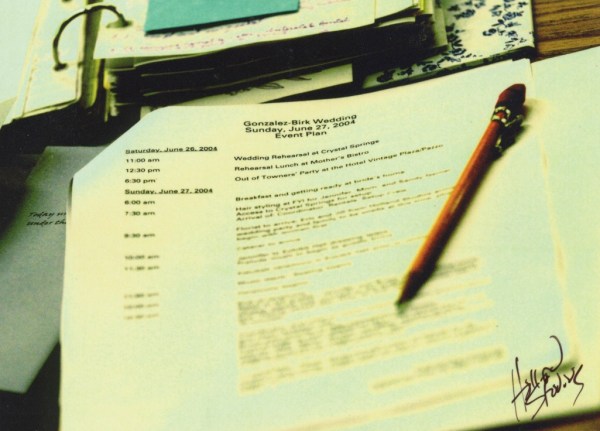I get a lot of requests for Wedding Day Coordination that begin: “We just want someone that can keep everything running smoothly, keep the flow going and keep us on schedule.”

Let’s break this down, then:
Keep us on schedule.
What goes into a schedule? And how will your coordinator know what it is? A wedding day coordinator will normally put in 20-30 hours of advance preparation before appearing at your wedding. This includes collecting and reviewing all of your contracts to ensure understanding of everything you have arranged and what you are entitled to; review of your wedding design, venue, and vendor policies; understanding you and your families’ preferences and decisions about what you want to achieve on the day; and speaking personally with all vendors to reconfirm arrangements. Often the coordinator will condense this information into an timeline event plan. Twenty to thirty hours. And that’s just pre-event.
Keep the flow going.
What is “flow” when it comes to a wedding, anyway? I interpret it as that magical mix of timing and logistics that makes your wedding feel joyful and unplanned, while at the same time using every moment allotted to you by the venue and your vendors to the best possible advantage.
How does flow happen? Well, it doesn’t “just” happen. A coordinator keeps the flow going by being present throughout the day and nudging things along according to what’s been agreed to and what current conditions may be affecting the flow of the day.
Keep everything running smoothly.
On the day of the event, in order to keep everything running smoothly, a wedding planner may have to deal with a multitude of issues behind the scenes. Here are the most common ones:
- prep time, especially hair and makeup, not going as scheduled
- transportation and parking woes
- decor issues: wrong color, wrong piece or fit
- missing items and going back for them
- lateness of vendors or bridal party
Of course, a good wedding coordinator is going to prevent most of these from happening by doing some detailed research, outreach to vendors, and prep work well before the day-of.
Even if everything goes 100% perfectly (and the reality is, it doesn’t) a wedding day coordinator still must be constantly available to act as a surrogate host, direction-giver, traffic controller, scheduler, and people-mover. They must be on site well before you or any guests or vendors arrive, and stay on site long after everyone has departed. These duties will take 12-16 hours to complete on the wedding day itself. Not to mention 1-2 hours of rehearsal time explaining the procedures to the wedding party and family; and the little post-rehearsal errands that always seem to come up.
In sum, while your wedding day planner’s job is to “just keep the flow going and keep everything on schedule”, in order to do that, they and their staff must put in upwards of 48+ solid hours of work, both on- and off-site, that results in your well-run wedding day.